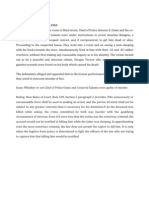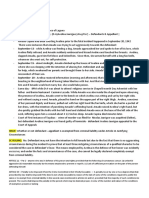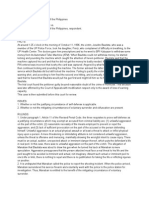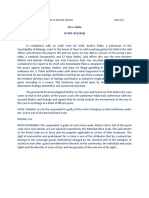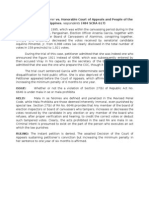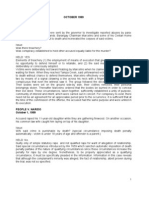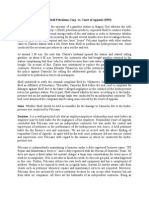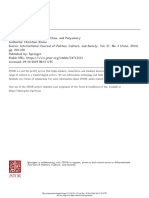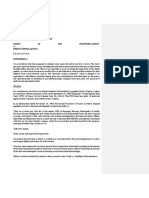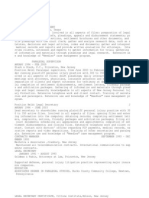People V Beronilla
People V Beronilla
Uploaded by
DegardCopyright:
Available Formats
People V Beronilla
People V Beronilla
Uploaded by
DegardOriginal Description:
Original Title
Copyright
Available Formats
Share this document
Did you find this document useful?
Is this content inappropriate?
Copyright:
Available Formats
People V Beronilla
People V Beronilla
Uploaded by
DegardCopyright:
Available Formats
TITLE: THE PEOPLE OF THE PHILIPPINES, plaintiff-appellee, NO.
26
Vs. MANUEL BERONILLA, FILIPINO VELASCO, POLICARPIO PACULDO, and JACINTO ADRIATICO,
defendants-appellants.
CITATION: G.R. No. L-4445 February 28, 1955
NATURE OF THE ACTION:
FACTS:
After Japanese occupation, Borjal served as mayor during the Japanese occupation. Beronilla, after being
appointed as Military Mayor of La Paz, Abra, received a copy of a memorandum issued by Lt. Col. Arnold
authorizing all military mayors to appoint a hury of 12 bolomen to try persons accused of treason,
espionage or the aiding of the enemy. He also received a list of all puppet officials of the province of
Abra (Borjal included) with a memorandum instructing all Military Mayors to investigate said persons
and gather against them complaints from people of the municipality. Beronilla, upon the return of Borjal
who left La Paz because of an attempt on his life, placed Borjal under custody. Pursuant to his
instructions, complaints were gathered, a 12-man jury was appointed, prosecutors and a clerk of the jury
were assigned. Trial lasted for 19 days and the jury found Borjal guilty on all counts (espionage, aiding
the enemy, abuse of authority). Death penalty was imposed. Beronilla forwarded the records of the case
to the Headquarters of the 15th Infantry for review. The records were returned by Lt. Col. Arnold adding
that the matter was best handled by the La Paz Government and whatever disposition taken was
approved. Upon receipt of the letter, Beronilla then ordered the execution of Borjal. The execution was
reported to Col. Arnold and Beronilla received compliments based on the reply of his superior. Two years
after, those who were involved were indicted in the CFI of Abra for murder for allegedly conspiring and
confederating in the execution of Borjal. The defendants were convicted, thus this appeal.
Issue: W/N the defendant-appellants actions are covered by justifying circumstances for obedience to
lawful order of superior
Ruling: Yes. The accused acted upon orders of their superior officers, which as military subordinates,
they could not question and obeyed in good faith without the being aware of its illegality.
Ratio Decidendi:
The evidence is sufficient to sustain the claim of the defense that arrest, prosecution and trial of Borjal
was done in pursuant to express orders of superiors. Additionally, it could not be established that
Beronilla received the radiogram from Colonel Volckmann, overall area commander, which called
attention to the illegality of Borjals conviction and sentence. Had Beronilla known the violation, he
would not have dared to report it to Arnold. The conduct of the accused also does not show malice on
their part because of the conduct of the trial, defense through counsel given to Borjal, suspension of trial
based on doubts of illegality and death sentence review sent to the superior officers.
You might also like
- International Sales Representative Agreement SampleDocument11 pagesInternational Sales Representative Agreement SampleGlobal Negotiator100% (1)
- Case Digest People vs. OanisDocument1 pageCase Digest People vs. OanisOscar Ryan Santillan77% (13)
- (Digest) People v. Oanis, 74 Phil. 257Document2 pages(Digest) People v. Oanis, 74 Phil. 257Joel Pino Mangubat100% (3)
- People V DioDocument1 pagePeople V DioJerico GodoyNo ratings yet
- Us V PenalosaDocument1 pageUs V PenalosaDegardNo ratings yet
- Digest JustifyingDocument22 pagesDigest JustifyingAngel Sarte100% (3)
- 26 - People Vs JaurigueDocument1 page26 - People Vs JaurigueNhorry MNo ratings yet
- Crim Cases DigestDocument4 pagesCrim Cases DigestColeenNo ratings yet
- INTOD Vs CADocument2 pagesINTOD Vs CAJoyleen HebronNo ratings yet
- #17.people vs. Silvestre and AtienzaDocument1 page#17.people vs. Silvestre and AtienzaGladys CubiasNo ratings yet
- Crim Case Digest Manaban vs. People of The PhilippinesDocument14 pagesCrim Case Digest Manaban vs. People of The Philippinesalexia100% (3)
- People Vs GonzalesDocument2 pagesPeople Vs GonzalesTaJheng Barde100% (1)
- Mamangun Vs People DigestDocument1 pageMamangun Vs People DigestdreaNo ratings yet
- Intod vs. CADocument1 pageIntod vs. CARoxanne AvilaNo ratings yet
- People Vs BibatDocument1 pagePeople Vs BibatErwin BernardinoNo ratings yet
- Criminal Law DigestDocument11 pagesCriminal Law DigestTrisha Dela RosaNo ratings yet
- 173 People v. Latupan, G.R. No. 112453, 28 June 2001Document1 page173 People v. Latupan, G.R. No. 112453, 28 June 2001Mario MorenoNo ratings yet
- US v. PabloDocument1 pageUS v. PabloWilliam Christian Dela CruzNo ratings yet
- Garcia Vs CA PDFDocument1 pageGarcia Vs CA PDFmeh100% (1)
- People V TaneoDocument1 pagePeople V TaneoSteve Rojano ArcillaNo ratings yet
- People Vs RafananDocument1 pagePeople Vs RafananDianne Camille UyNo ratings yet
- People vs. ValledorDocument2 pagesPeople vs. ValledorAlmer TinapayNo ratings yet
- Criminal Law 1 Digest Vda vs. Medina Until Valenzuela vs. PeopleDocument36 pagesCriminal Law 1 Digest Vda vs. Medina Until Valenzuela vs. PeopleKarl PunzalNo ratings yet
- Magno Vs CA - DigestDocument1 pageMagno Vs CA - Digestdominicci2026100% (3)
- People Vs PunoDocument1 pagePeople Vs PunoPrincessAngelaDeLeon100% (1)
- US vs. Diaz CondeDocument1 pageUS vs. Diaz Condedazzingbangaw100% (1)
- Velasco Vs PeopleDocument2 pagesVelasco Vs PeopleSam MaulanaNo ratings yet
- Valenzuela V PeopleDocument3 pagesValenzuela V PeopleRicky James Laggui SuyuNo ratings yet
- Garcia Vs PeopleDocument1 pageGarcia Vs PeopleHazel Joy Galamay - GarduqueNo ratings yet
- People v. NarvaezDocument1 pagePeople v. NarvaezJohn TurnerNo ratings yet
- People Vs AgacerDocument2 pagesPeople Vs AgacerdreaNo ratings yet
- Jacinto Vs People Case DigestDocument2 pagesJacinto Vs People Case DigestRS Mcpas100% (6)
- 3 People Vs DungoDocument2 pages3 People Vs DungoLindsay Mills100% (1)
- People Vs SylvestreDocument1 pagePeople Vs SylvestreJun MagdaraogNo ratings yet
- Exempting CircumstancesDocument13 pagesExempting CircumstancesBuknoy Pineda100% (4)
- CRIM1 Case DigestsDocument27 pagesCRIM1 Case DigestsLianne Kathrin CoNo ratings yet
- Crim Case Nos. 11-20Document7 pagesCrim Case Nos. 11-20AliyahDazaSanders100% (1)
- OCTOBER 1999 People V. Marcelino October 1, 1999Document168 pagesOCTOBER 1999 People V. Marcelino October 1, 1999JasminNo ratings yet
- Felonies #7 People v. Silvestre and Atienza DigestDocument1 pageFelonies #7 People v. Silvestre and Atienza DigestJeong50% (2)
- Criminal Law 1 - DigestsDocument29 pagesCriminal Law 1 - DigestsNafiesa Imlani100% (2)
- Crim CaseDocument20 pagesCrim CaseSharlie BayanNo ratings yet
- People v. Maleza 14 PHIL 468Document3 pagesPeople v. Maleza 14 PHIL 468AnonymousNo ratings yet
- PEOPLE V LamahangDocument3 pagesPEOPLE V LamahangHannes100% (1)
- Crim DigestDocument26 pagesCrim Digestdsgpojgpopo67% (3)
- ARTICLE 17 - 19 Crim Law Compilation Case DigestDocument36 pagesARTICLE 17 - 19 Crim Law Compilation Case DigestPamela100% (2)
- People Vs Deopante 331 Phil. 998: The Facts According To The ProsecutionDocument10 pagesPeople Vs Deopante 331 Phil. 998: The Facts According To The ProsecutionNorman CaronanNo ratings yet
- People v. SabalonesDocument2 pagesPeople v. SabalonesRNicolo BallesterosNo ratings yet
- People v. UralDocument1 pagePeople v. UralMarc VirtucioNo ratings yet
- PP Vs Simon Case DigestDocument4 pagesPP Vs Simon Case DigestMyra Soriano LucasNo ratings yet
- Serrano vs. PeopleDocument9 pagesSerrano vs. PeopleJeanne CalalinNo ratings yet
- Ladonga Vs PeopleDocument1 pageLadonga Vs PeopleJsa GironellaNo ratings yet
- People Vs AlbuqueruqueDocument1 pagePeople Vs Albuqueruqueshopee onlineNo ratings yet
- Article 8 DigestDocument79 pagesArticle 8 DigestCharlene Hatague100% (1)
- CANTA VsDocument2 pagesCANTA VsvabolilanNo ratings yet
- US v. TANEDODocument2 pagesUS v. TANEDOABbo HernandezNo ratings yet
- People Vs Pugay DigestDocument8 pagesPeople Vs Pugay DigestZy Aquilizan100% (1)
- People vs. Sy PioDocument3 pagesPeople vs. Sy PioPrincessAngelaDeLeon100% (2)
- (CRIMLAW) People v. Madarang (p.11, Case 2)Document1 page(CRIMLAW) People v. Madarang (p.11, Case 2)Aquino, JP100% (2)
- US v. Dela CruzDocument1 pageUS v. Dela CruzJohn TurnerNo ratings yet
- 108 People V Beronilla - DigestDocument1 page108 People V Beronilla - DigestPam RamosNo ratings yet
- People v. BeronillaDocument1 pagePeople v. BeronillaThird VillareyNo ratings yet
- G.R. No. L-4445 - People V Beronilla 96 Phil 566Document2 pagesG.R. No. L-4445 - People V Beronilla 96 Phil 566RMFB3 - PRM Section100% (1)
- Royal Supermart MemoDocument5 pagesRoyal Supermart MemoDegardNo ratings yet
- Consti 16 Case Digest Ruiz Vs CabahugDocument1 pageConsti 16 Case Digest Ruiz Vs CabahugDegardNo ratings yet
- Us V CatolicoDocument1 pageUs V CatolicoDegardNo ratings yet
- US vs. CUNADocument1 pageUS vs. CUNADegard100% (1)
- Consti 17: The Holy See vs. HON. Eriberto U. Rosario, JRDocument1 pageConsti 17: The Holy See vs. HON. Eriberto U. Rosario, JRDegardNo ratings yet
- People Vsi ADocument1 pagePeople Vsi ADegardNo ratings yet
- People Vs GatchalianDocument9 pagesPeople Vs GatchalianDegardNo ratings yet
- Marcos Vs Chief of StaffDocument1 pageMarcos Vs Chief of StaffDegardNo ratings yet
- Crim Cases To DigestDocument2 pagesCrim Cases To DigestDegard100% (1)
- Soriano V PeopleDocument2 pagesSoriano V PeopleDegard100% (1)
- Consti 22 Lim V BrownellDocument1 pageConsti 22 Lim V BrownellDegard100% (1)
- Co Kim Chan V Valdez Tan KehDocument2 pagesCo Kim Chan V Valdez Tan KehDegardNo ratings yet
- Consti Cases To DigestDocument2 pagesConsti Cases To DigestDegardNo ratings yet
- Muslim LawDocument2 pagesMuslim LawSARIKANo ratings yet
- Levack and Others V Regional Magistrate, Wynberg, and Another 2004 (5) Sa 573 (ScaDocument10 pagesLevack and Others V Regional Magistrate, Wynberg, and Another 2004 (5) Sa 573 (ScaRodney UlyateNo ratings yet
- Same Sex Marriage Position PaperDocument6 pagesSame Sex Marriage Position Paperapi-27383908489% (47)
- Deon Jones v. City and County of Denver, Et. Al.Document16 pagesDeon Jones v. City and County of Denver, Et. Al.Michael_Lee_RobertsNo ratings yet
- POSC 121 FinalDocument5 pagesPOSC 121 Finalaseel.almuftiNo ratings yet
- G.R. No. L-36731: Godinez V. Fong Pak Luen FactsDocument1 pageG.R. No. L-36731: Godinez V. Fong Pak Luen FactsLean Manuel Paragas100% (1)
- N.Y. Ins. Law 2119©Document2 pagesN.Y. Ins. Law 2119©ACELitigationWatchNo ratings yet
- Case Digests On Freedom of Expression-1!9!16Document33 pagesCase Digests On Freedom of Expression-1!9!16Jhudith De Julio BuhayNo ratings yet
- ANNEX 2B Child Protection Policy-CPPDocument3 pagesANNEX 2B Child Protection Policy-CPPLeah MadesNo ratings yet
- Negotiable InstrumentsDocument4 pagesNegotiable InstrumentsShamaarajShankerNo ratings yet
- PP VS RamosDocument2 pagesPP VS RamosJacqueline WadeNo ratings yet
- Prosource International Vs Horphag Research ManagementDocument7 pagesProsource International Vs Horphag Research ManagementHarry PotterNo ratings yet
- Grade 10 SF2 2019 2020Document40 pagesGrade 10 SF2 2019 2020Ghia Cressida HernandezNo ratings yet
- Service AgreementDocument2 pagesService Agreementvenus papaNo ratings yet
- Giron V OchoaDocument8 pagesGiron V OchoaJanMikhailPanerioNo ratings yet
- Advertising and Sales Promotion Solved Mcqs Set 1Document7 pagesAdvertising and Sales Promotion Solved Mcqs Set 1Vashu YadavNo ratings yet
- Pilipinas Shell Petroleum Corp. Vs CADocument2 pagesPilipinas Shell Petroleum Corp. Vs CATeff QuibodNo ratings yet
- Poly EconomicsDocument19 pagesPoly EconomicsSaumya SunidhiNo ratings yet
- Crim Arts 1-10 CasesDocument157 pagesCrim Arts 1-10 CasesMJNo ratings yet
- Dass Bank Ltd. Vs Smt. Kali Kumari Debi and Anr. Ranjit Singh and Anr. Vs Naubat and Ors. (For Surety)Document14 pagesDass Bank Ltd. Vs Smt. Kali Kumari Debi and Anr. Ranjit Singh and Anr. Vs Naubat and Ors. (For Surety)Shivani SinhaNo ratings yet
- Legal Systems in BusinessDocument74 pagesLegal Systems in BusinessVijaya KumarNo ratings yet
- Form 2 Civics PDFDocument26 pagesForm 2 Civics PDFKashindye Lucas100% (1)
- United States Court of Appeals Third CircuitDocument31 pagesUnited States Court of Appeals Third CircuitScribd Government DocsNo ratings yet
- Bihar Apartment Ownership Act2006Document20 pagesBihar Apartment Ownership Act2006Latest Laws TeamNo ratings yet
- Paralegal or Legal AssistantDocument2 pagesParalegal or Legal Assistantapi-78537526No ratings yet
- City of Manila Vs IacDocument6 pagesCity of Manila Vs IacCayen Cervancia CabiguenNo ratings yet
- Republic of The Philippines Supreme Court ManilaDocument14 pagesRepublic of The Philippines Supreme Court ManilaJNo ratings yet
- Fill in The Blanks 101-150 Family CodeDocument15 pagesFill in The Blanks 101-150 Family CodeKatherine DizonNo ratings yet
- ASL v. Sec of Agrarian ReformDocument2 pagesASL v. Sec of Agrarian ReformJomar TenezaNo ratings yet

